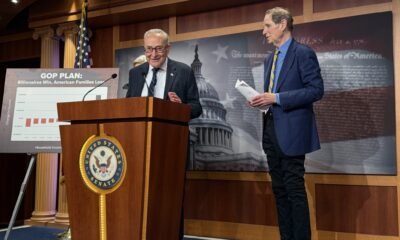Chuck Schumer
U.S. House Stumbles as Government Shutdown Deadline Approaches with Stopgap Spending Bill

WASHINGTON — With only 12 days remaining before a potential government shutdown, Congress faces mounting pressure to reach an agreement on a short-term funding bill. Republican leaders in the House and their Democratic counterparts in the Senate have yet to commence negotiations, increasing concerns about the looming deadline.
On Wednesday, House GOP leaders attempted to advance a six-month continuing resolution. However, the vote failed, garnering only 202 out of 220 votes, with two members abstaining and 14 Republicans opposing it. This failure followed a call from Republican presidential nominee Donald Trump, urging lawmakers to leverage a shutdown to secure a proof-of-citizenship requirement for voter registration.
Trump stated on social media, “If Republicans don’t get the SAVE Act, and every ounce of it, they should not agree to a Continuing Resolution in any way, shape, or form.” His remarks intensified the calls for a hardline stance on funding negotiations.
The unsuccessful vote presents an opportunity for Speaker Mike Johnson, a Republican from Louisiana, to engage in negotiations with the Senate. However, time is short. With only one week remaining before Congress embarks on a six-week election recess, leaders must finalize a bill, conduct votes in both chambers, and secure President Joe Biden’s approval.
During a press conference, Johnson acknowledged the possibility of a government funding lapse starting on October 1, stating, “We’re on the field in the middle of the game, the quarterback is calling the play, we’re going to run the play.” He criticized the Senate for not progressing further in the appropriations process, shifting the responsibility for a potential shutdown towards the upper chamber.
The Senate Appropriations Committee made headway this summer, approving 11 funding bills with bipartisan support. In contrast, the House managed to push through several appropriations largely along party lines, lacking cross-party collaboration. Both chambers have refrained from conferencing on the bills, hindering the usual legislative process.
Senate Minority Leader Mitch McConnell emphasized the need to prevent a shutdown, stating that it would be “politically beyond stupid.” He urged colleagues to await the House’s proposal and noted that the ultimate resolution would hinge on discussions between Senate Majority Leader Chuck Schumer and Johnson.
The tradition of relying on stopgap spending bills has become commonplace as Congress often fails to finalize full-year funding by the October 1 deadline. This year’s struggle has intensified with election-year politics driving the dialogue.
The House’s failed resolution does not enjoy broad support among Senate Republicans, as some argue that a lengthy stopgap could complicate the confirmation of the next president’s Cabinet. Concerns have also been raised regarding potential impacts on national defense during the transitional period.
As discussions progress, any final stopgap bill is expected to extend funding through December 20, the last scheduled legislative day for the year. This resolution is unlikely to include the controversial voter ID provision, focusing instead on critical funding allocations.
Florida Republican Rep. Mario Díaz-Balart predicted that Congress would likely approve a stopgap bill through mid-December. “We can’t have a shutdown,” he stressed, citing the potential catastrophic consequences in a volatile global landscape.
A shutdown would not only affect various federal departments but also leave some employees working without pay until a resolution is reached. Despite misgivings, Congressional leaders, including Idaho Republican Rep. Mike Simpson, expressed confidence in avoiding a shutdown, underscoring that no viable option exists for such an outcome.

















